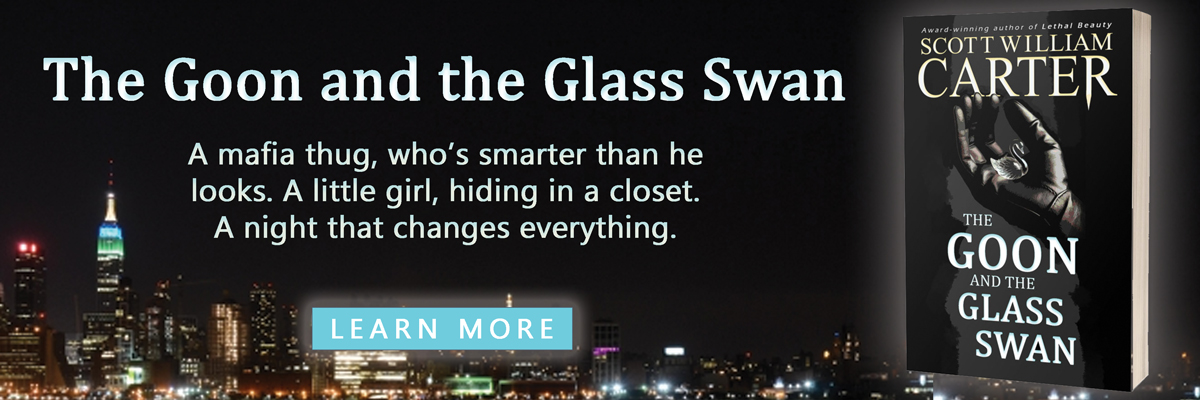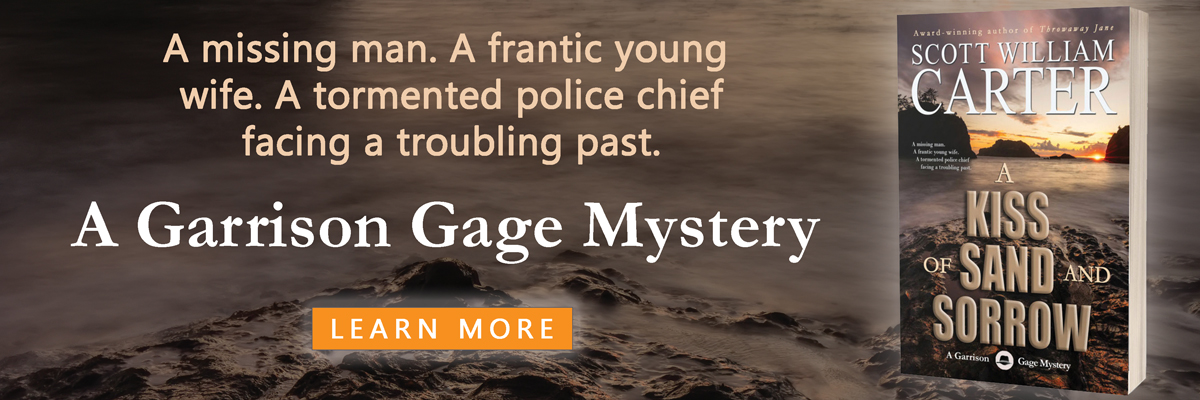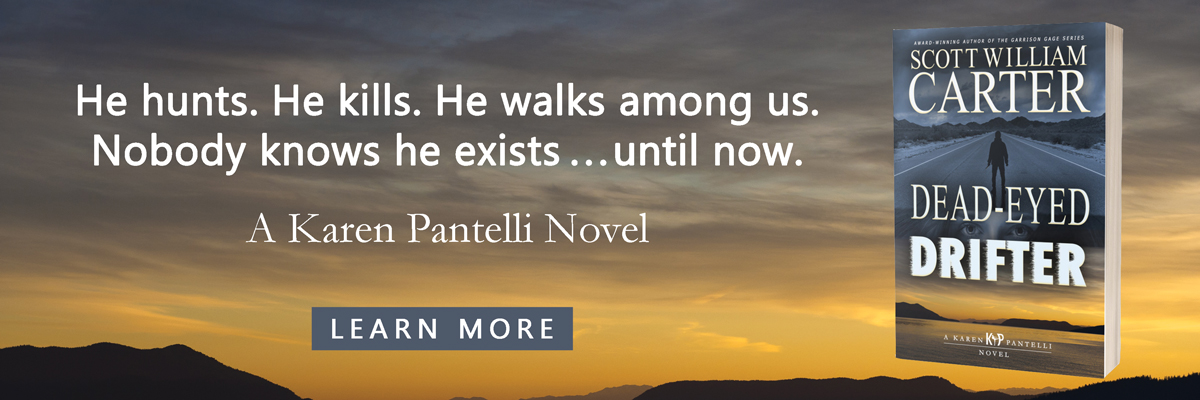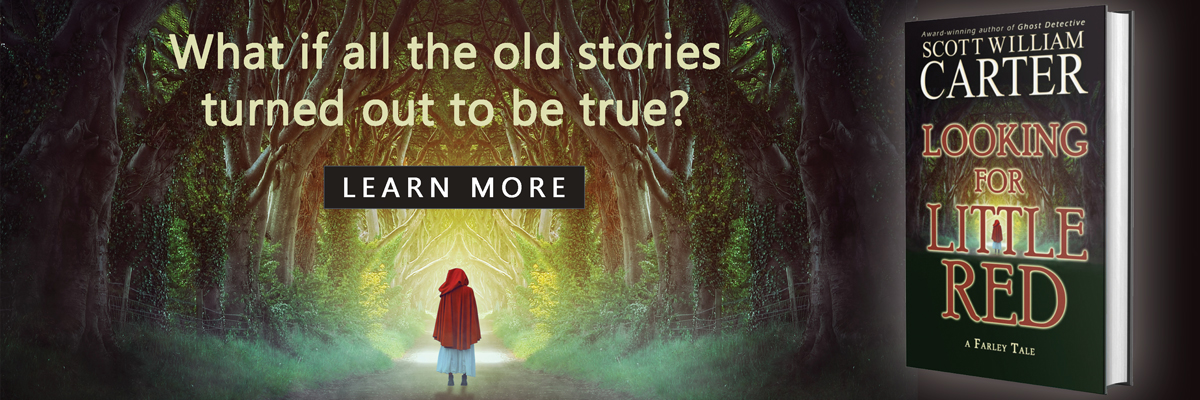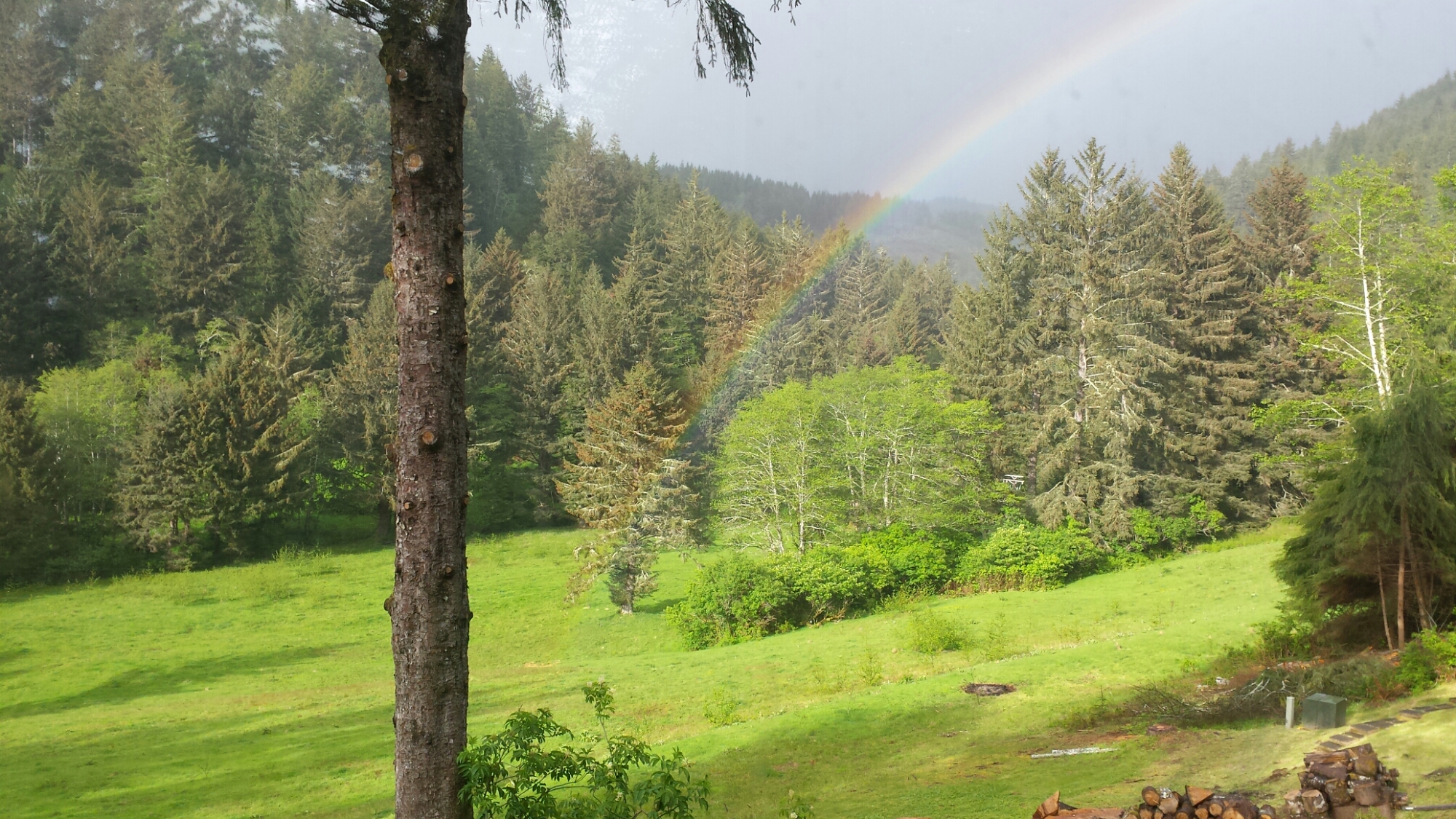 Kids had no school on Monday, so we took a quick weekend jaunt to the coast, staying in a house in the hills above Neskowin. A bit rainy off and on, but then it did allow my wife to take this photo (which is our view from the living room). If you strain, you can just make out the gold at the end of the rainbow …
Kids had no school on Monday, so we took a quick weekend jaunt to the coast, staying in a house in the hills above Neskowin. A bit rainy off and on, but then it did allow my wife to take this photo (which is our view from the living room). If you strain, you can just make out the gold at the end of the rainbow …
A New Gage Book Coming Soon, Plus Some Thoughts on the Merging of My Two Careers
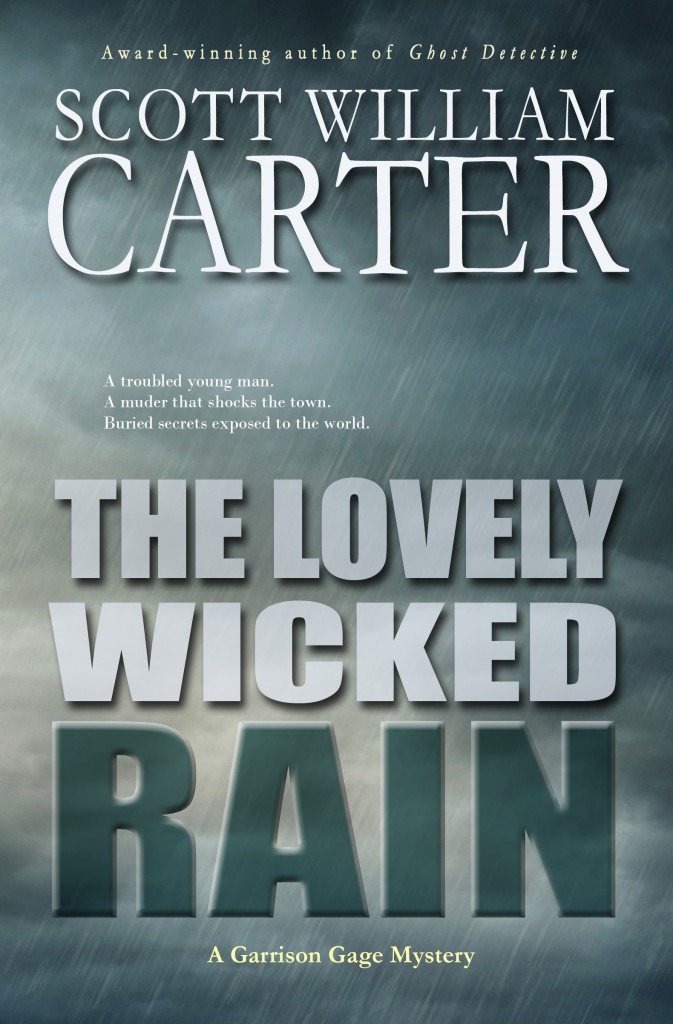 Finally, a bit of book publishing news! I’m putting the final touches on the next Garrison Gage book, The Lovely Wicked Rain. That’s the cover on the right, though the final version might undergo a bit of tweaking. After copy editing, manuscript layout, and other publishing-related tasks, both the ebook and the trade paperback edition should be out in the world in early June. June 9 is the official publication date, but my guess is it will be available before then. My usual process is to let my “New Release” email list know first when it’s actually available, then post the news on the website and other places. If you want to be one of the first to know, sign up on the right. I send no more than a handful of emails a year, if that.
Finally, a bit of book publishing news! I’m putting the final touches on the next Garrison Gage book, The Lovely Wicked Rain. That’s the cover on the right, though the final version might undergo a bit of tweaking. After copy editing, manuscript layout, and other publishing-related tasks, both the ebook and the trade paperback edition should be out in the world in early June. June 9 is the official publication date, but my guess is it will be available before then. My usual process is to let my “New Release” email list know first when it’s actually available, then post the news on the website and other places. If you want to be one of the first to know, sign up on the right. I send no more than a handful of emails a year, if that.
This is the third Gage book, and the first to be published exclusively under my own name and not under my pen name, Jack Nolte. If you’re curious why I decided to let go of the pen name, read this post. I’ll have a book description and other information up before too long.
It’s been two years since the last Gage book, far too long. In fact, by the time The Lovely Wicked Rain actually gets published, it will have been a year since my last book came out, Ghost Detective. I’m not the most prolific writer in the world, but that’s still pretty slow by my standards. I have my excuses, of course, but that’s all they are, excuses.
That, and some other changes I’ll mention in a minute, forced me to take a hard look at how productive I really am as a writer, which in turn got me to start getting up early again. And it’s worked wonders.* I shifted my schedule a bit at the university, started getting up early, and now get two hours of writing in most days before I leave the house. This isn’t so much about trying to take the publishing world by storm as it is about feeding my soul the proper amount of creative time to keep me balanced. You would have thought I would have realized how often I was letting the writing slip just based on how cranky I was, but no. Sometimes I have to get hit with a mental sledgehammer.
I’ve also gone back to graduate school. What’s that, you say, graduate school? Yep. Since some changes at the university had me transferred to the library, my day job as an instructional technologist and my writing/publishing life have started to merge, something I never would have predicted even five years ago but makes complete sense now. In fact, at the encouragement of the dean of the library here, I started to look into the direction libraries are moving in the digital era, and realized that libraries, especially academic libraries, will eventually become not just repositories of information — but the place where information is created and distributed, which means publishing.
I am speaking of publishing in its broadest sense, which means to make public. This could be a website, a digital video, or, yes, a book (whether ebook or print-on-demand). Since this is the direction my job has been moving, I decided about six months ago to head back to graduate school to get a Master of Library and Information Science, with as much emphasis in my studies on the publishing/distribution side of the field. Whether the degree pays off at this university, or another place, I’ll have to wait to see, but I just decided to jump in with both feet — and I’m really enjoying the ride so far.
With the writing, the work at the university, graduate school, and all the craziness that comes from having an active eleven-year-old and eight-year-old, I’m busier than ever. Funny thing, though, once I started getting my writing time in early, I’m more productive not just overall, but in each area of my life. I guess it proves the old maxim that if you want to get something done, give it to a busy man.
These recent changes have also allowed me to finally put to rest a bit of schizophrenia I had about my two careers. On one hand, I treat my writing very seriously, and always labored under the assumption that I’d eventually become a full-time writer one day. On the other hand, I’ve always enjoyed the work I do at the university — plus it has to be said, as someone who has been self-employed before, that a steady paycheck and good benefits are nice things to have! But with the merging of these two careers, I no longer struggle with this issue. They’re all just part of the same pie.
As Walt Whitman says, I contain multitudes. And it’s just the way I like it.
You may have noticed some additional blogging around these parts. That will continue. I noticed that my web traffic has jumped by about 50%, so I guess some people are appreciating it. I’m also back on social media, at least Facebook and Twitter so far, not to promote my work, because I hate being spammed as much as you do, but to connect with like-minded folks. (In fact, rather than add a comment section, I’m experimenting by just using Facebook. So friend me or follow me and become part of the conversation!) I might start doing a few more conferences, workshops, and other speaking engagements, but that will be a slow change, considering how crazy busy I am right now. I’ve gotten a few invitations lately, and I’m carefully considering them.
Anyway, that’s the state of play in Scott-land. Busy, tired, but a lot more productive and at peace, so life is good.
*Speaking of writing productivity, I’m well into the sequel to Ghost Detective. Expect news about that before too long.
Some Great Thoughts on Creativity
 Brainpickings.org has a great post today on creativity, focused on Jerome Bruner’s book, “On Knowing: Essays for the Left Hand,” but loaded with musings from Mark Twain, Henry Miller, Carl Jung, Alexander Graham Bell, and Leo Tolstoy, among others, with lots of follow-up links if you want to read further. At the heart of Bruner’s analysis is this simple sentence:
Brainpickings.org has a great post today on creativity, focused on Jerome Bruner’s book, “On Knowing: Essays for the Left Hand,” but loaded with musings from Mark Twain, Henry Miller, Carl Jung, Alexander Graham Bell, and Leo Tolstoy, among others, with lots of follow-up links if you want to read further. At the heart of Bruner’s analysis is this simple sentence:
An act that produces effective surprise [is] the hallmark of the creative enterprise.
Read the rest over at “Legendary Harvard Psychologist Jerome Bruner on the Art of “Effective Surprise” and the 6 Essential Conditions of Creativity.” A long post, but worth a few minutes of your time.
A 25 Cent Book in 1950 Would Be $2.44 Today
That’s if you trust the Bureau of Labor Statistics, with its terrific CPI Inflation Calculator, which lets you enter an amount going all the way back to 1913, and, with the click of a button, see what the inflation-adjusted price would be today — or another year.
I checked this site in response to David Gaughran’s blog post, “The Great E-book Pricing Question,” where he makes a number of interesting points:
There’s more guff written about pricing than almost anything else, resulting in an extremely confusing situation for new self-publishers. I often see them pricing too low or too high, and the decision is rarely made the right way, i.e. ascertaining their goals and pricing accordingly … [Read the rest at Let’s Get Visible.]
I think David glosses over the mountains of research that do show that price affects the perception of value, not to mention the side benefit of being able to run sale prices at steeper discounts, which often has more positive results (Bookbub.com has a nice post on this), but that aside, his overall point is valid — that indie publishers can cry all they want that their books should be worth more than a cup of coffee, but what the writer wants, and what the market will bear, are not the same thing.
Amazon lists most of their genre fiction ebooks at $4.99, with backlist often at $3.99. Is this the correct price? Four years after publication, Simon and Schuster still sells the ebook edition of my first novel for $11.76, a price I think is insane, but who knows, perhaps they’re onto something. My sharp friends Kristine Kathryn Rusch and Dean Wesley Smith generally advocate pricing a little higher than most indie authors, and they have valid reasoning behind their approach, especially when you consider they have started a traditional publishing company, albeit one that’s smartly taking advantage of all the new technologies. And of course there are loads of writers, like Joe Konrath, who happily price at $2.99 or $3.99 and are doing very well. Who’s correct?
No one, at least as far as I’m concerned. Or everyone. With ebooks, price can’t primarily be about supply and demand, because supply is infinite, but it is affected by not only what consumers are willing to pay, but also by your goals as a publisher. There is no correct price for all ebooks.
Now, that said, where do I come down? I think Amazon is probably onto something, but even they, with their mountains of proprietary data on their own customer’s buying habits, which you would think would give them an enormous advantage, currently only have five out of the top twenty books on their own Kindle bestseller list. A twenty-five percent hit rate is pretty good, but that’s their own bestseller list on their own site for a product they created! (And look at how prices are all over the map on that list; that alone should tell you something.) Still, I think ebooks are closer in parallel to movie rentals, and no one says that a .99 movie rental at your local Redbox is somehow devaluing the movie. Louis CK now sells his comedy specials direct to his fans for $4.99, and he’s made millions doing so. It’s a pretty safe bet that his fans don’t think he’s devaluing his work, but instead think they’re getting a good deal. That’s what I think, anyway, and I’m one of them.
What’s wrong with giving people a good deal?
Which brings me back to the title of this blog post. When the paperback novel was released in Britain, and here in America, it was just as much a gamechanger as the ebook. That’s why the arguments about cheap book prices devaluing literature sound so familiar. We’re just rehashing the same argument that was had about paperbacks. “My books are certainly worth more than a Big Mac at McDonalds!” the writer claims. Well, that certainly may be true to that writer, but who cares? The average price of a Big Mac in America in January 2014 was $4.64, which is pretty close to where Amazon prices their genre ebooks, and most writers would be happy to move as many ebooks as McDonalds moves Big Macs. Pocket Books priced paperbacks in the forties and early fifties at 25 cents and sold millions — a price that would be the equivalent of just under $3 today. Boy, did some folks howl about how books priced so low couldn’t be “real books,” just as the reincarnated literati, like zombies who eat books instead of brains, say the same thing today.
The Pocket Books strategy sounds pretty familiar to indie authors — try to sell books outside the traditional distribution channels. Today’s indie author is following a similar model by selling outside traditional publishers altogether. If you dig even deeper into history, though, you’ll see that even Pocket Books, which only wanted to focus on reprints in the beginning, did its part to safeguard the status quo:
“Successful authors are not interested in original publishing at 25 cents,” Freeman Lewis, executive vice-president of Pocket Books said. Hardcover publisher Doubleday’s LeBaron R. Barker claimed that the concept could “undermine the whole structure of publishing.” Hardcover publishers, of course, had a vested interest in maintaining the status quo. They were still receiving 50 percent of the royalties by selling reprint rights.
Fawcett silenced the skeptics by selling more than nine million copies within six months. Authors did the math, and writers of genre fiction—thrillers, Westerns, and romance especially—jumped at the opportunity to write paperback originals. Still, “serious” literary writers insisted on staying in the hardcover market for the prestige, and critics in turn declined to review paperback originals. Clearly, the stigma was still there … [Read the rest at the Smithsonianmag.com]
Sound familiar? There are lots of authors who refuse to self-publish because of perceived stigma, just as there are lots of authors who do self-publish but refuse to price their ebooks too low for the same reason.
As I said, I don’t think anybody is right here, just people with different goals and different biases, but studying the rise of paperback prices over the years (Mike Shatzkin has a nice older post on this that’s worth reading), it’s obvious that the cost of an average paperback rose much faster than inflation. This might have more to do with changes in the distribution system than publisher greed, but whatever the cause, all we’re seeing now is a return to a time when cheap books brought in waves of new readers, turning what used to be an activity of a tiny “educated” minority into something the masses could enjoy.
And it looks like cheap ebooks are doing the same. What could be wrong with that?
——
If you enjoyed this post, consider buying one of my own ebooks, most of which are currently priced at $4.99. That’s a little more than a Big Mac, but not by much.

